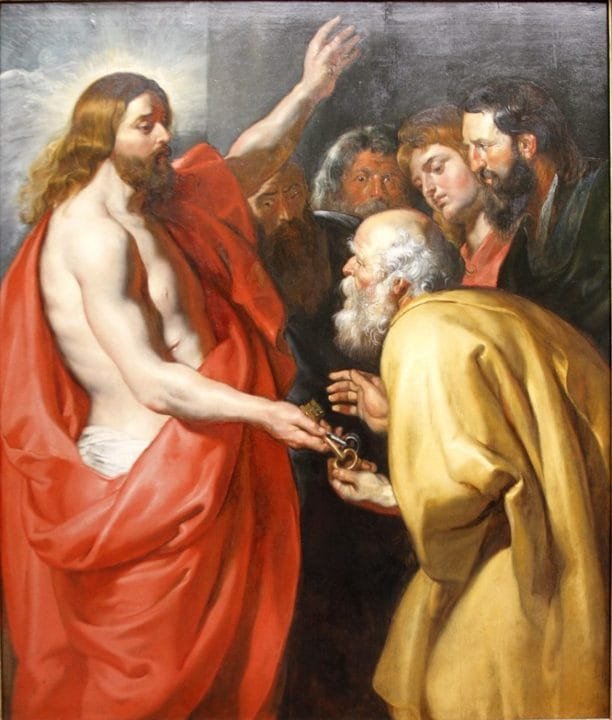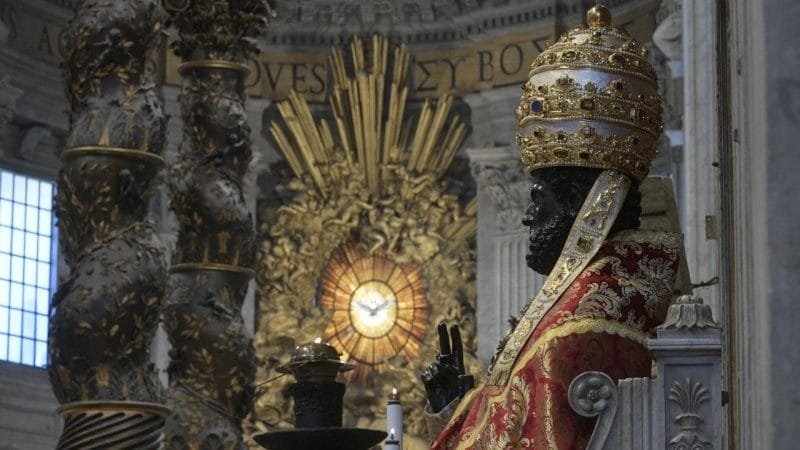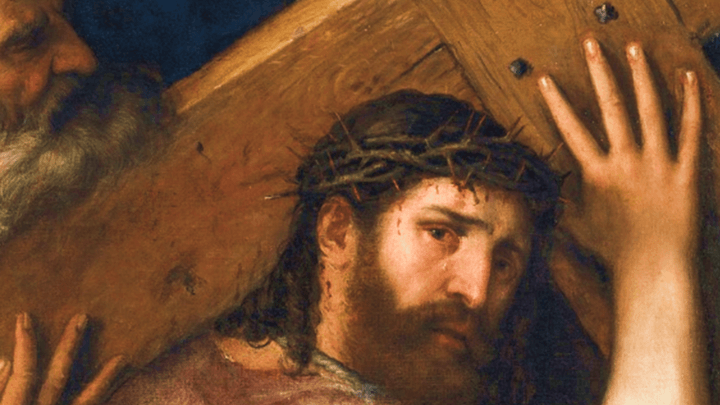Friday, 7th week of Easter
DAILY GOSPEL COMMENTARY:
“LORD YOU KNOW THAT I LOVE YOU“
(Jn 21:15-19).

READING I
Acts 25:13b–21
King Agrippa and Bernice arrived in Caesarea on a visit to Festus. Since they spent several days there, Festus referred Paul’s case to the king, saying, “There is a man here left in custody by Felix. When I was in Jerusalem the chief priests and the elders of the Jews brought charges against him and demanded his condemnation. I answered them that it was not Roman practice to hand over an accused person before he has faced his accusers and had the opportunity to defend himself against their charge. So when they came together here, I made no delay; the next day I took my seat on the tribunal and ordered the man to be brought in. His accusers stood around him, but did not charge him with any of the crimes I suspected. Instead they had some issues with him about their own religion and about a certain Jesus who had died but who Paul claimed was alive. Since I was at a loss how to investigate this controversy, I asked if he were willing to go to Jerusalem and there stand trial on these charges. And when Paul appealed that he be held in custody for the Emperor’s decision, I ordered him held until I could send him to Caesar.”
RESPONSORIAL PSALM
R. The Lord has established his throne in heaven.
Or: Alleluia.
Bless the Lord, O my soul;
and all my being, bless his holy name.
Bless the Lord, O my soul,
and forget not all his benefits.
R. The Lord has established his throne in heaven.
Or: Alleluia.
For as the heavens are high above the earth,
so surpassing is his kindness toward those who fear him.
As far as the east is from the west,
so far has he put our transgressions from us.
R. The Lord has established his throne in heaven.
Or: Alleluia.
The Lord has established his throne in heaven,
and his kingdom rules over all.
Bless the Lord, all you his angels,
you mighty in strength, who do his bidding.
R. The Lord has established his throne in heaven.
Or: Alleluia.
ALLELUIA
The Holy Spirit will teach you all things, and remind you of all I have said to you.
Gospel of Friday, 7th week of Easter.
(Jn 17:20-26).
After Jesus had revealed himself to his disciples and eaten breakfast with them, he said to Simon Peter, “Simon, son of John, do you love me more than these?” Simon Peter answered him, “Yes, Lord, you know that I love you.” Jesus said to him, “Feed my lambs.” He then said to Simon Peter a second time, “Simon, son of John, do you love me?” Simon Peter answered him, “Yes, Lord, you know that I love you.” He said to him, “Tend my sheep.” He said to him the third time, “Simon, son of John, do you love me?” Peter was distressed that he had said to him a third time, “Do you love me?” and he said to him, “Lord, you know everything; you know that I love you.” Jesus said to him, “Feed my sheep. Amen, amen, I say to you, when you were younger, you used to dress yourself and go where you wanted; but when you grow old, you will stretch out your hands, and someone else will dress you and lead you where you do not want to go.” He said this signifying by what kind of death he would glorify God. And when he had said this, he said to him, “Follow me.”
GOSPEL COMMENTARY from the Navarre Bible, Commentary to the Gospel of St. John (with permission)
15-17: THE PRIMACY OF PETER: FEED MY LAMBS, FEED MY SHEEP.

- Jesus Christ had promised Peter that he would be the primate of the Church (cf. Mt 16:16-19 and note on same). Despite his three denials during our Lord’s Passion, Christ now confers on him the primacy he promised.
- “Jesus questions Peter three times, as if to give him a triple chance to atone for his triple denial. Peter has learned his lesson from the bitter experience of his wretchedness. Aware of his weakness, he is deeply convinced that rash claims are pointless. Instead he puts everything in Christ’s hands. ‘Lord, you know well that I love you’” (J. Escrivá, Friends of God, 267).
- The primacy was given to Peter directly and immediately. So the Church has always understood — and so Vatican I defined: “We therefore teach and declare that, according to the testimony of the Gospel, the primacy of jurisdiction over the universal Church of God was immediately and directly promised and given to Blessed Peter the Apostle by Christ our Lord. . . . And it was upon Simon Peter alone that Jesus after his Resurrection bestowed the jurisdiction of chief pastor and ruler over all his fold in the words: ‘Feed my lambs; feed my sheep” (Pastor aeternus, chap. I).
- The primacy is a grace conferred on Peter and his successors, the Popes; it is one of the basic elements in the Church, designed to guard and protect its unity:
- “In order that the episcopate also might be one and undivided, and that… the multitude of the faithful might be kept secure in the oneness of faith and communion, he set Blessed Peter over the rest of the Apostles, and fixed in him the abiding principle of this twofold unity, and its visible foundation” (Pastor aeternus, Dz-Sch 3051; cf. Vatican II, Lumen gentium, 18).
- Therefore, the primacy of Peter is perpetuated in each of his successors: this is something which Christ disposed; it is not based on human legislation or custom.
- By virtue of the primacy, Peter, and each of his successors, is the shepherd of the whole Church and vicar of Christ on earth, because he exercises vicariously Christ’s own authority. Love for the Pope, whom St Catherine of Siena used to call “the sweet Christ on earth”, should express itself in prayer, sacrifice and obedience.
18-19: FOLLOW ME.

- According to Tradition, St Peter followed his Master to the point of dying by crucifixion, head downwards,
- “Peter and Paul suffered martyrdom in Rome during Nero’s persecution of Christians, which took place between the years 64 and 68. St Clement, the successor of the same Peter in the see of the Church of Rome, recalls this when, writing to the Corinthians, he puts before them ‘the generous example of these two athletes’: ‘due to jealousy and envy, those who were the principal and holiest columns suffered persecution and fought the fight unto death” (Paul VI, Petrum et Paulum).
- “Follow me!”: these words would have reminded the Apostle of the first call he received (cf. Mt 4:19) and of the fact that Christ requires of his disciples complete self-surrender: “If any man would come after me, let him deny himself and take up the Cross daily and follow me” (Lk 9:23).
- St Peter himself, in one of his letters, also testifies to the Cross being something all Christians must carry: “For to this you have been called, because Christ also suffered for you, leaving you an example, that you should follow in his steps” (1 Pet 2:21).
VIDEO REFLECTION ON TODAY’S GOSPEL
TOPIC 1: WHAT KIND OF LOVE ARE YOU PREPARED TO GIVE OTHERS?
In today’s gospel reading, Jesus reminds us of what love should be – to God and to those around us, our families and the world. If you will recall, Peter denied Jesus three times before Jesus was crucified. And when Jesus resurrected, He appeared to Peter and asked him three times, “Do you love me?”
In this age of dating apps, where is love and how can we continue to manifest true love?
TOPIC 2: When did you last express your love for those around you?
Jesus gently asks Peter three times, “Do you love me?”
We are asked to reflect deeply on this repeated questioning because both of them knew that Peter was unable to even profess knowing Jesus, denying Him three times out of fear and confusion. Remember the cock crowing incident with Peter after Christ’s passion? Today’s reflection focuses on two things:
First, do we express our love enough, and perhaps, more than less, to those around us – our wives, our children our parents, our siblings, our friends? Between a man and a woman, perhaps, it is the woman who asks the man that question not just three times but many times. It is, perhaps, because expressions of love may not be enough, or, perhaps, such expressions may be waning, from the woman’s viewpoint, that out of insecurity, she asks the man of her life that question repeatedly. Indeed, that was what Paul said to the Ephesians, speaking on behalf of Jesus, for husbands to love their wives. It was a statement made to men only because, on one hand, women are already innately loving and need not be reminded. On the other, generally, men can become insensitive and forgetful in expressing their love.
Husbands, there are many ways to express our love for our wives – and for that matter – our children and, definitely, those around us. It need not just be roses and chocolates, but acts of kindness that will endear us to them.
Second, we are also asked by Jesus that question – do you love me, maybe not just three times, but many times. And if we say we do, He asks us to follow Him through the difficult and arduous road of life. For example, if we truly love Him, can we do what He does to us everytime we sin and ask for forgiveness? Can we also show mercy and compassion to those who have hurt us seventy times seven times?
Stay updated: subscribe by email for free TO OUR NEW WEBSITE www.catholicsstrivingforholiness.org (PUT YOUR EMAIL IN THE SUBSCRIBE WIDGET).
We are also in www.fb.com/Catholicsstrivingforholiness. Kindly help more people in their Christian life by liking our page and inviting your family, friends and relatives to do so as well. Thanks in advance and God bless you and your loved ones! Fr. Rolly Arjonillo

